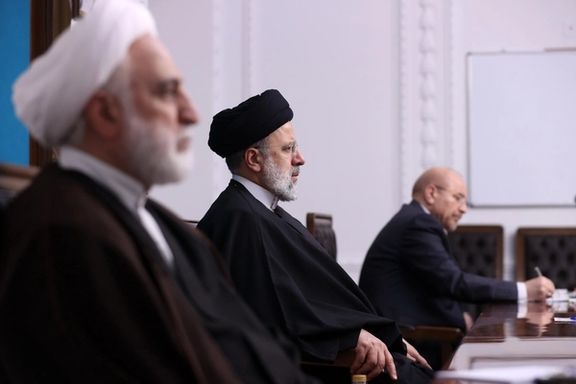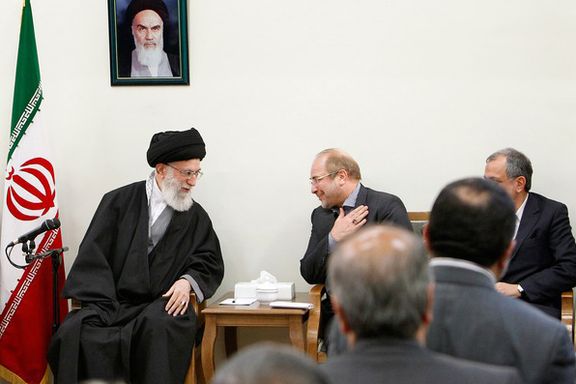Raisi Faces Serious Challenges From Political Rivals And Top Clerics

On Tuesday, the Iranian Parliament dealt a significant blow to President Ebrahim Raisi by rejecting the budget bill he had previously presented.

On Tuesday, the Iranian Parliament dealt a significant blow to President Ebrahim Raisi by rejecting the budget bill he had previously presented.
The surprising turn of events occurred just one day after the parliament's Budget Committee had given its approval to the very same bill.
This isn't the first time that President Raisi has finds himself in such a predicament, which would undoubtedly be a source of annoyance and humiliation for any of his predecessors. Raisi has encountered similar challenges twice before with budget bills, and he has developed a strategy to navigate through such impasses.
It is highly likely that Raisi will take his grievances to Supreme Leader Ali Khamenei, trying to prove to him that "others" do not let him do his job. This isn't unfamiliar territory for Raisi, as he has resorted to this tactic in the past. Khamenei may either address the matter personally or refer it to the heads of the three branches of government, a three-member council in which Raisi wields considerable influence, potentially enabling him to dictate terms to his political rival, Parliament Speaker Mohammad Bagher Ghalibaf.
However, Raisi's challenges extend beyond the confines of the parliament (Majles). In addition to the members of the Majles who believe that opposing Raisi will help them win favor with disgruntled voters in the upcoming March elections, Ghalibaf stands to gain from Raisi's weakness and lack of popularity. There are also influential clerics in Qom, the Grand Ayatollahs, who feel the need to demonstrate both their understanding of the people's problems and their power to keep the President in check.

Raisi's ultimate trump card is the golden signature or a phone call from Khamenei to Ghalibaf, ensuring the bill's approval with minor adjustments. After all, it's Khamenei's budget, and Raisi serves as his front.
A report carried by Khabar Online website on Tuesday revealed that Raisi faces significant challenges in Qom rather than Tehran. Prominent clerics like Ayatollah Hossein Mazaheri, a source of emulation in the Iranian clerical hierarchy, have publicly criticized the Raisi Administration's economic performance. Mazaheri pointedly conveyed his concerns, stating, "The people are facing serious economic hardships. Society is grappling with financial problems, causing some to turn away from religion and ethics." He further emphasized that Iran has not experienced a worse economic situation in the past century. While Mazaheri's office later stated that his remarks were not intended for media publication, he did not retract his statements, maintaining their validity.
According to the report, the Raisi Administration has faced more criticism from top clerics than any previous government. Raisi himself disclosed that every time he presents an economic report to Khamenei, the Leader teasingly asks him, "What's the situation on the ground?" This has led some observers to speculate that Raisi and his cabinet may operate in a realm where their fabricated statistics are treated as factual.
Khamenei has called upon the Raisi Administration to address the country's economic challenges at least twice in recent months, as reported by Khabar Online. Moreover, similar statements have been echoed by numerous other clerics, emphasizing the widespread dissatisfaction with the economic status quo.
Ayatollah Nouri Hamadani has also criticized Raisi’s inability to prevent the devaluation of the Iranian currency. However, some observers argue that Raisi's performance is just one facet of the problem. Issues such as inflation and currency devaluation are also linked to the failure of Iran's foreign policy, which is under Khamenei's absolute control and beyond the influence of an individual such as Raisi.
Certain influential clerics, such as Ayatollah Naser Makarem Shirazi, have criticized the Iranian state TV for overlooking the Raisi Administration's economic weaknesses. Conversely, Iranian media frequently censure state television for supporting the government despite its shortcomings. Some grand ayatollahs have also chastised state television for failing to broadcast their criticisms of the government.
These criticisms have provided non-clerical presidential candidates with hope that Khamenei may reconsider his support for Raisi and open the door for individuals like Tourism Minister Ezzatollah Zarghami and Majles Speaker Ghalibaf, who have already begun garnering support for their potential candidacies in the 2025 presidential elections.
While Iran boasts no shortage of candidates for prominent positions, the critical question is whether Khamenei, who has consistently minimized the influence of individuals within his inner circle, will ever permit new faces to enter the political arena.